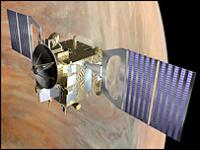







|
News and Information
Europe's Venus mission delayed
| October 21, 2005 |

Venus Express, European Space Agency
Mission guide: Venus Express
The launch of Europe's first mission to Venus, due to have taken place next Wednesday, has been postponed.
The European Space Agency (Esa) has not yet announced a new date for the launch, only that it will be delayed by "several days".
The probe is to blast off aboard a Russian Soyuz rocket from Baikonur Cosmodrome in Kazakhstan.
It will slip into orbit around Venus next year, using science instruments to study the planet from space.
Esa said the delay had been prompted by the discovery that insulation from the rocket launcher had contaminated the Venus Express spacecraft.
"The satellite is contaminated, so they will have to dismantle and re-mount it again," a spokesperson for the space agency told the BBC News website.
Venus Express will also need to be cleaned up to remove any trace of the insulation.
The contaminating material either came from the rocket's upper "Fregat" stage, which helps to boost the satellite into its intended orbit, or from the fairings, which protect the spacecraft during launch.
The spacecraft will carry out the first global investigation of Venus' atmosphere, to shed light on how the planet evolved its hellish climate.
Composed chiefly of carbon dioxide, Venus' atmosphere generates intense greenhouse warming, whereby trapped solar radiation heats the surface of the planet to an average of temperature of 467C.
Experts think Venus could teach us more about how the Earth's climate will respond to the release of greenhouse gases resulting from human activities.
After separation of the Soyuz rocket's three lower stages, the upper "Fregat" stage with the orbiter mounted on top enters a sub-orbital trajectory.
After two burns, Fregat will launch the spacecraft into an escape trajectory that takes it directly to Venus.
In about five months, Venus Express will reach its target and enter an elliptical polar orbit around our nearest planetary neighbour. |
Source: www.bbc.com |
| http://news.bbc.co.uk/2/hi/science/nature/4365704.stm |
|
| Support Caprivi Freedom |
Fill out the form below to become a member of this site and receive our regular newsletter.
|

|

